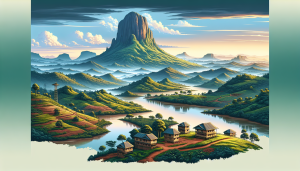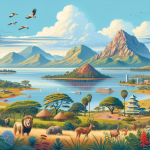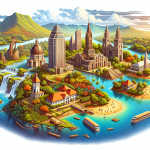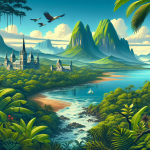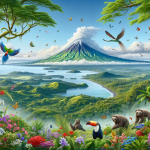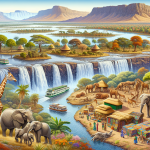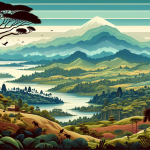Exploring the Rich Tapestry of Cameroon: A Travel Blogger’s Dream Destination
Cameroon, often referred to as “Africa in Miniature,” is a country that encapsulates the diverse landscapes, cultures, and wildlife of the entire African continent. From its sun-kissed coastline along the Atlantic Ocean to its lush rainforests, towering mountains, and expansive savannas, Cameroon offers a unique and enriching experience for travelers. The country’s vibrant cultural tapestry, influenced by over 250 ethnic groups, and its rich history make it a fascinating destination for anyone keen on exploring Africa. This article delves into the various aspects of Cameroon, providing insights into its must-visit places, cultural heritage, and practical travel tips, ensuring that you get the most out of your Cameroonian adventure.
Discovering Cameroon’s Natural Wonders
Cameroon’s diverse geography means that nature lovers will find plenty to marvel at. Whether you’re an avid hiker, a wildlife enthusiast, or a beach lover, Cameroon has something to offer.
Mount Cameroon
One of the most significant natural attractions in Cameroon is Mount Cameroon, an active volcano and the highest peak in West Africa. Standing at over 4,000 meters, this mountain offers a challenging yet rewarding climb, with panoramic views of the surrounding landscape. The annual Mount Cameroon Race of Hope attracts athletes from around the world, eager to test their endurance on this formidable volcano. Whether you participate in the race or opt for a guided trek, Mount Cameroon promises an unforgettable experience.
Waza National Park
For those interested in wildlife, Waza National Park in the Far North Region is a must-visit. This park is one of Cameroon’s most famous reserves, home to elephants, lions, giraffes, and a plethora of bird species. A safari in Waza offers a chance to see these magnificent animals in their natural habitat. The best time to visit is during the dry season, from November to May, when animals gather around water sources, making them easier to spot.
Cultural Riches: A Melting Pot of Traditions
Cameroon’s cultural diversity is one of its most compelling features. With over 250 ethnic groups, the country boasts a rich tapestry of traditions, languages, and festivals.
Bamenda: The Heart of Cultural Heritage
Located in the Northwest Region, Bamenda is a cultural hub that offers a deep dive into Cameroonian traditions. The city is home to the Bamenda Ring Road, a scenic route that takes you through several traditional kingdoms and villages. Here, you can witness traditional ceremonies, crafts, and dances that have been preserved for generations. The Fon’s Palace in Bafut is particularly notable, offering insights into the history and culture of the Tikar people.
The Festivals of Cameroon
Cameroon is a country of festivals, each reflecting the unique cultural heritage of its people. The Ngondo Festival of the Sawa people, held in Douala, is a vibrant celebration of the river gods, featuring boat races, traditional dances, and ceremonies. In the West Region, the Nguon Festival in Foumban brings together the Bamoun people for a week of cultural activities, including traditional wrestling, music, and dance. These festivals provide a unique opportunity for travelers to immerse themselves in local traditions and customs.
Practical Travel Tips for Cameroon
Traveling to Cameroon requires some preparation to ensure a smooth and enjoyable trip. Here are some practical tips to help you plan your journey.
Health and Safety
Before traveling to Cameroon, it’s essential to get the necessary vaccinations, including yellow fever, hepatitis A and B, and typhoid. Malaria is also prevalent, so take appropriate precautions, such as taking anti-malarial medication and using insect repellent. While Cameroon is generally safe for tourists, it’s advisable to stay informed about the current security situation and avoid any regions with travel advisories.
Getting Around
Cameroon’s transportation infrastructure varies widely, with well-developed roads in urban areas and more challenging conditions in rural regions. Domestic flights are available for longer distances, while buses and shared taxis are common for shorter trips. Renting a car with a driver is also a convenient option for exploring more remote areas. When traveling within cities, taxis and motorcycle taxis, known as “benskins,” are readily available but always negotiate the fare beforehand.
Culinary Delights: A Taste of Cameroon
No visit to Cameroon would be complete without indulging in its diverse and flavorful cuisine. The country’s culinary traditions reflect its cultural diversity, offering a wide range of dishes that cater to different tastes.
Traditional Dishes to Try
Cameroonian cuisine is hearty and flavorful, often featuring ingredients like plantains, cassava, yams, and various meats and fish. Some must-try dishes include:
- Ndolé: This dish is considered the national dish of Cameroon. It consists of bitter leaves cooked with groundnuts, meat, or fish, creating a rich and savory flavor.
- Poulet DG: This is a popular dish among the elite, made with chicken, plantains, and a variety of vegetables, all cooked in a flavorful tomato sauce.
- Ekwang: A traditional dish of the Bakweri people, Ekwang is made from grated cocoyams wrapped in cocoyam leaves and cooked with spices, meat, or fish.
Street Food Adventures
For a more casual dining experience, Cameroon’s street food scene offers a variety of delicious options. Grilled fish, known as Poisson Braisé, is a popular choice, often served with plantains and spicy sauces. Suya, a skewered meat dish seasoned with a blend of spices, is another street food favorite. These dishes provide a quick and tasty way to experience Cameroonian flavors.
Hidden Gems: Off the Beaten Path
While Cameroon’s well-known attractions are certainly worth visiting, the country also has several hidden gems that offer unique experiences away from the crowds.
Rhumsiki
Located in the Far North Region, Rhumsiki is a picturesque village known for its stunning landscapes and traditional way of life. The village is surrounded by dramatic rock formations, with the Rhumsiki Peak being the most famous. Visitors can explore the village, interact with local artisans, and enjoy breathtaking views of the surrounding countryside. The Crab Sorcerer, a local fortune-teller who uses crabs to predict the future, is a unique cultural experience not to be missed.
Bénoué National Park
For a more secluded wildlife experience, Bénoué National Park in the North Region offers an opportunity to see animals like hippos, buffaloes, and various antelope species. The park is less frequented by tourists, allowing for a more intimate and tranquil safari experience. The Bénoué River, which flows through the park, adds to its scenic beauty and provides excellent opportunities for birdwatching.
Sustainable Travel in Cameroon
As you explore Cameroon, it’s important to consider the impact of your travels on the environment and local communities. Sustainable travel practices can help preserve the country’s natural and cultural heritage for future generations.
Supporting Local Communities
One way to travel sustainably in Cameroon is by supporting local businesses and communities. Choose locally-owned accommodations, eat at local restaurants, and buy crafts and souvenirs directly from artisans. This not only provides economic benefits to local communities but also allows you to experience the country’s culture more authentically.
Responsible Wildlife Tourism
When participating in wildlife tourism, such as safaris or visits to national parks, choose operators that prioritize conservation and animal welfare. Avoid any activities that exploit or harm wildlife, and follow guidelines to minimize your impact on natural habitats. Supporting conservation initiatives, such as community-based wildlife programs, can also contribute to the preservation of Cameroon’s rich biodiversity.
Planning Your Cameroonian Adventure
Cameroon offers an incredible array of experiences, from its stunning natural landscapes and diverse wildlife to its rich cultural heritage and delicious cuisine. Proper planning can help you make the most of your trip and ensure a memorable and enriching experience.
When to Visit
The best time to visit Cameroon depends on the activities you’re interested in. The dry season, from November to May, is ideal for wildlife viewing and outdoor activities. The wet season, from June to October, brings lush landscapes and fewer crowds but can make travel more challenging due to heavy rains.
Essential Travel Documents
Ensure you have a valid passport and obtain a visa before traveling to Cameroon. It’s also advisable to carry copies of important documents, such as your passport, visa, and travel insurance, in case of emergencies.
Conclusion: Embrace the Magic of Cameroon
Cameroon is a destination that truly has it all, offering a microcosm of Africa’s diverse landscapes, cultures, and wildlife. Whether you’re trekking up Mount Cameroon, exploring the vibrant streets of Bamenda, or savoring the flavors of Ndolé and Poulet DG, this country promises an adventure like no other. By embracing sustainable travel practices and immersing yourself in the local culture, you can experience the magic of Cameroon while contributing to its preservation for future generations. So pack your bags, set your spirit of adventure free, and get ready to explore the rich tapestry of Cameroon.
